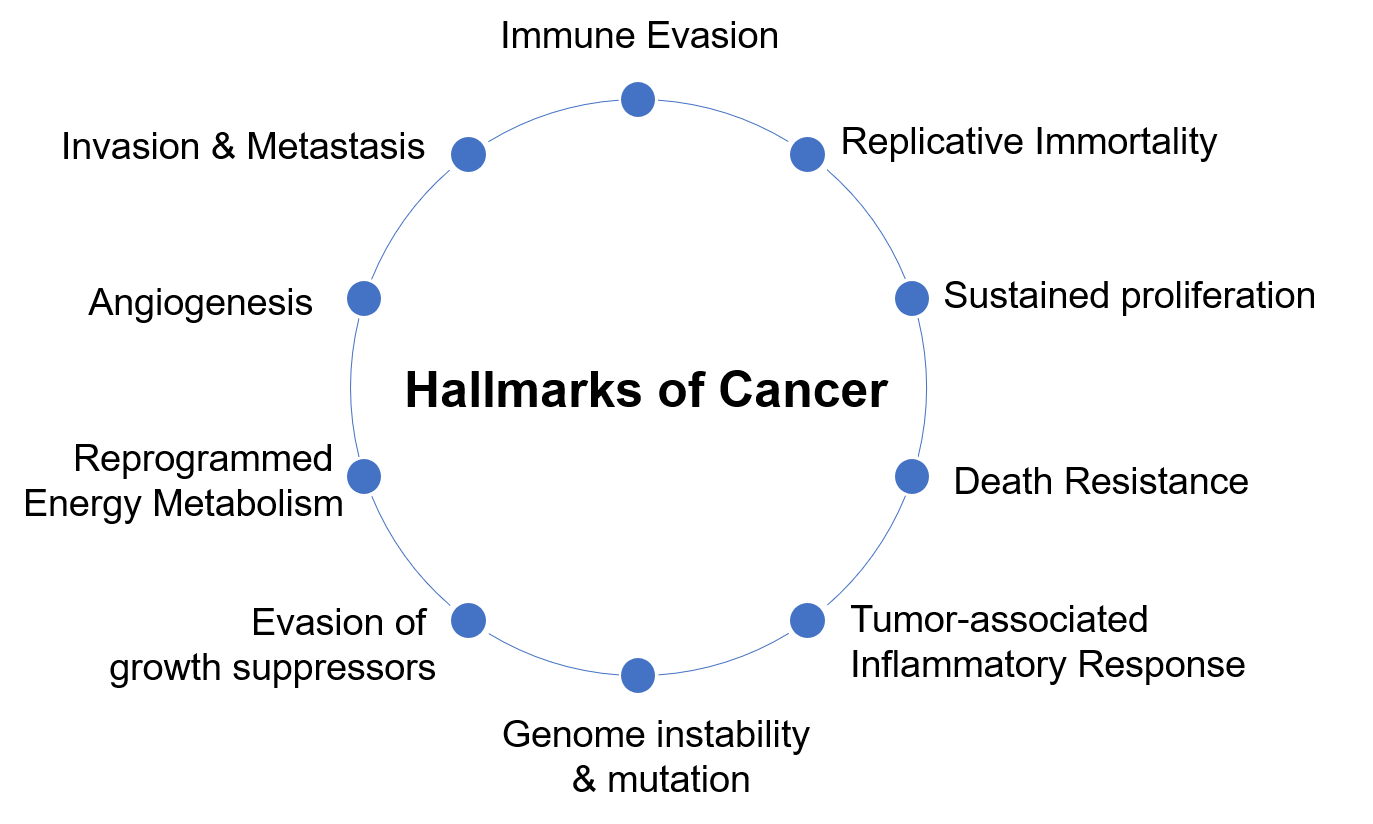Online Inquiry
Cancer & Tumorigenesis
Cancer describes the disease with uncontrolled cell growth. It's one of the most common causes of death in the United States. The financial costs of cancer are estimated to be over $150 billion per year nationally. Thus, the research of cancer has always been popular, aiming at the development of safe and effective methods to prevent, detect, diagnose, treat and ultimately cure the disease.
As a trusted CRO, CD BioSciences provides a comprehensive panel of solutions covering all aspects of life science research, including cancer.

Overview of Cancer & Tumorigenesis
Tumorigenesis, also called Oncogenesis or Carcinogenesis, is the formation of cancer, which is driven by characteristic alterations that allow cells to overproliferate and escape mechanisms that control their growth.
There are over 100 types of cancer affecting humans. According to WHO, the number of new cases exceeds 19 million and the number of deaths is about 10 million worldwide in 2020.

Classification of Cancer
| Carcinoma | A malignant neoplasm derived from epithelial cells, which account for 80-90% of cancer cases. It includes cancers developing in the breast, prostate, lung, pancreas, bladder, and colon. |
| Sarcoma | A type of cancer arising from supportive and connective tissues, e.g., bones, tendons, cartilage, muscle, nerve and fat. |
| Myeloma | A type of blood cancer that hits the plasma cells of bone marrow. Myeloma cancer cells make abnormal antibodies. |
| Leukemia | A type of blood cancer, starts in the bone marrow, and is often associated with the overproduction of abnormal blood cells. |
| Lymphoma | A type of blood cancer. It develops from lymphocytes stored in lymph nodes, and affects other parts of the lymphatic system. |
| Germ Cell Tumor | GTC. A neoplasm derived from germ cells., normally presenting inside the gonads (ovary and testis). |
| Blastoma | More common in children. A type of cancer derived from immature precursor cells or embryonic tissue. |
Cell Signaling in Tumorigenesis
There are multiple signaling pathways that contribute to cell proliferation, motility and survival. In cancer, components of these pathways are often alternated resulting in dysregulation of cellular signaling. Signaling networks involved in the development and progression of cancer are targeted by many therapeutics developed or currently under development.
| Cancer Related Genes | |
| Oncogenes | Tumor Suppressor |
| An oncogene is a gene that contributes to the development of cancer when mutated or overexpressed. They are components of signaling pathways activated in physiological conditions. | A tumor suppressor gene, or anti-oncogene, is a gene that inhibits cell proliferation and tumor development. When mutated, tumor suppressor genes lose or have a reduction of their function. |
| Examples: Ras, EGFR, Raf, Akt, c-Myc, Wnt, Hedgehog (Hh), Hippo, and Notch. | Examples: p53, PTEN, Rb, VHL, APC. BRC2, NF1, and PTCH. |
- PI3K-Akt Pathway
- Ras-ERK Pathway
- Wnt/β-catenin Pathway
- Other Pathways
Key Components: PI3K, PTEN, Akt, TSCs, mTOR.
The PI3K-Akt signaling pathway regulates cell growth, proliferation, metabolism, motility, survival and apoptosis. Aberrant activation of the pathway has been observed in most human cancers, including breast cancer, colorectal cancer, ovarian cancer and prostate cancer.
Key Components: Ras, Raf, MEK, ERK.
Similar to PI3K-Akt pathway, Mitogen activated protein kinase (MAPK) cascades also regulate cellular processes such as proliferation, differentiation, apoptosis and stress responses. The Ras/ERK pathway is the most important signaling cascade among all MAPK pathways. Driver mutations in Ras (mainly K-Ras) appear in ~30% of all cancer types. And ~8% of all cancer types have the presence of Raf mutations (particularly in B-raf).
Key Components: WNTs, GSK-3β, APC, CK1α, β-catenin, TCF/Lef1.
Wnt/β-catenin signaling is implicated in cellular functions including proliferation, differentiation, migration, genetic stability, stem cell renewal and apoptosis. Aberrantly activated Wnt/β-catenin signaling facilitates cancer cell proliferation, differentiation and stem cell renewal, making it a focus of cancer therapeutic strategies.
Other signaling pathways involved in cancer development and progression include:
Solutions for Studying Cancer Signaling Pathways
Our solutions for cancer research include but are not limited to the following:
- Regulator Identification
- Regulator Characterization
- Mechanism Study
- Phenotype Analysis
- Animal Model Generation
- Chemical Screening
- Therapy Development
Identifying gene regulators participating in certain cancer signaling pathways.
Studying the molecular function of certain regulators in cancer signaling pathways.
Investigating into the mechanism of regulation of certain regulators.
Analyzing the cellular phenotypes regulated by genes/proteins of interest.
Generating animal models for certain types of cancer.
Screening inhibitors or activators of certain cancer signaling pathways.
Developing potential therapies for certain types of cancer.
Features
CD BioSciences offers cost-effect, high quality and hassle-free cancer related research solutions to our clients worldwide. We guarantee to deliver our products and results on time. Please feel free to contact us.
For research use only. Not intended for any clinical use.





